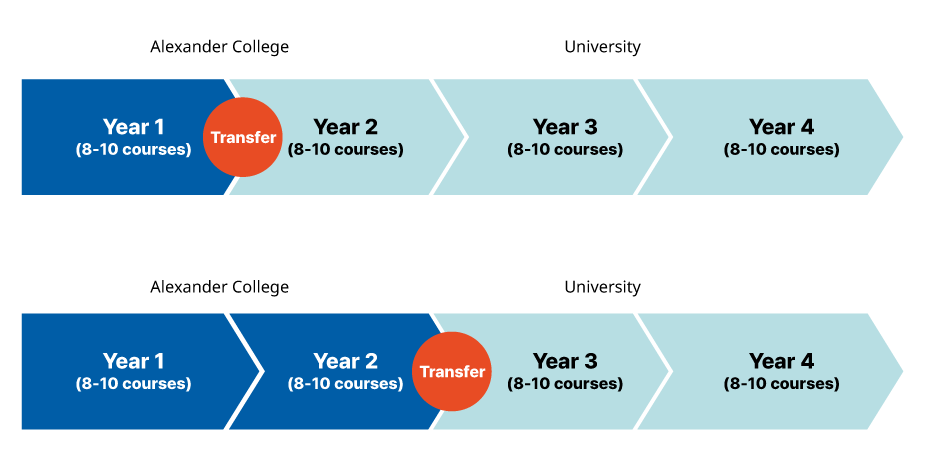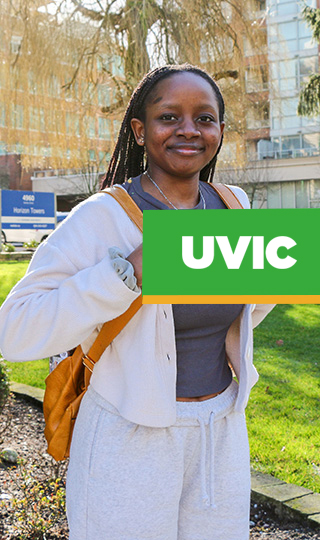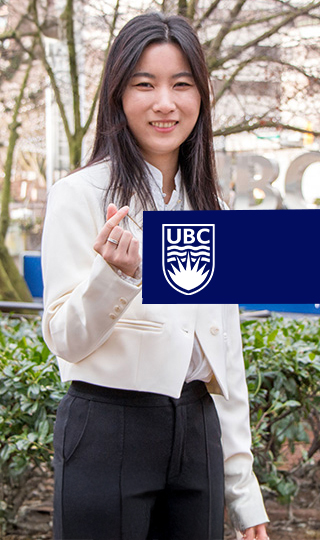Lead the future through Cloud Computing, AI Applications, Data Structures, Programming and Software Engineering courses.







Over 80% of Alexander College University Transfer students choose to complete additional credits, despite being eligible to transfer after earning 24 credits. High school grades are no longer considered for UT admission after completing over 24 credits with us.










Select a course below to see full descriptions. (#) Indicates amount of credits per course.
An introduction to elementary concepts in Computer Science and Information Technology. Topics include the history of computing, the basic structure of a digital computer system (hardware and software), networks, programming, internet, world-wide-web (WWW), and the social impacts of computer technology. This course is suitable for students with little or no programming background.
Prerequisite(s):
ENGL 088 (formerly EASL 089, ENGL 097), MATH 12 is recommended
Transfer to:
SFU CMPT 1XX (3), B-Sci
UVIC CSC 100 (1.5)
UNBC CPSC 1XX (3)
TRU COMP 1000 (3)
Basic programming constructs, data types, classes, interfaces, protocols, and the design of programs as interacting software components.
Prerequisite(s):
ENGL 088 (formerly EASL 089, ENGL 097), MATH 12 (C) or MATH 099 (C) or MATH 100
Transfer to:
UBC CPSC 1st (4)
SFU CMPT 120 (3), Q/B-Sci
UVIC CSC 110 (1.5)
UNBC CPSC 110 (3), CPSC majors see Academic Advisor
TRU COMP 1110 (3)
This course is intended for students who plan to major in Computer Science and offers an advanced introduction to programming. It focuses on data abstraction and object-oriented programming
Prerequisite(s):
ENGL 098, CPSC 111
Transfer to:
UBC CPSC 1st (4), Exempt UBC CPSC 260
SFU CMPT 125 (3), Q & SFU CMPT 127 (0), Exemption & SFU CMPT 128 (0), Exemption
UVIC CSC 115 (1.5)
UNBC CPSC 101 (4)
TRU COMP 1230 (3)
Offers an intensive introduction to discrete mathematics as it is used in computer science. Topics include functions, relations, sets, propositional and predicate logic, simple circuit logic, proof techniques, elementary combinatorics, and discrete probability.
Prerequisite(s):
ENGL 088 (formerly EASL 089, ENGL 097), MATH 12 (C) or MATH 100 (C)
Preclusion:
Students with credit for MATH 115 may not take CPSC 115 for further credit.
Transfer to:
UBC CPSC 1st (3), Exempt UBC CPSC 121; ALEX CPSC 115 (3) & ALEX CPSC 150 (3) = UBC CPSC 121 (4) & UBC CPSC 1st (2)
SFU MACM 101 (3), Q/B-Sci
UVIC MATH 122 (1.5)
UNBC CPSC 141 (3)
TRU COMP 1380 (3)
This course provides an introduction to networking, cloud computing, and the Internet of Things (IoT) for undergraduate students. Students will gain an understanding of these technologies and use popular tools and platforms with cybersecurity and privacy considerations. Topics include cloud storage, online business, e-commerce, social media management, and IoT applications.
Prerequisite(s):
ENGL 099
Transfer to:
SFU CMPT 1XX (3)
UBCV CPSC_V 1ST (3)
UNBC CPSC 1XX (3)
UVIC CSC 1XX (1.5)
This introductory course provides students with a comprehensive overview of Artificial Intelligence (AI). Students will explore the history, theory, and real-world applications of AI while understanding ethical, philosophical, and societal considerations. The course covers basic AI models, algorithms, and an introduction to prompt engineering which will help students interact appropriately and effectively with modern AI tools in their future studies and careers. Students will engage with practical AI tools, explore key concepts, and understand AI’s impact on various sectors.
Prerequisite(s):
ENGL 100
Transfer to:
SFU CMPT 1XX (3)
TRU COMP 1XXX (3)
UBCV CPSC_V 1ST (3)
UNBC CPSC 1XX (3)
UVIC CSC 1XX (1.5)
This course introduces the internal operation of computer systems. Topics include: Boolean algebra and combinational and sequential logic design, basic computer system organization, processor, memory, and input/output, information representation: number systems, integer floating point representation and character encoding, and an introduction to assembly language programming.
Prerequisite(s):
ENGL 098, CPSC 111 (CPSC 115/MATH 115 is strongly recommended)
Transfer to:
UBC CPSC 1st (3); ALEX CPSC 115 (3) & ALEX CPSC 150 (3) = UBC CPSC 121 (4) & UBC CPSC 1st (2)
SFU CMPT 1XX (3)
UVIC CSC 1XX (1.5)
TRU COMP 1XXX (3)
This course introduces students to basic planning and designing of effective web pages; implementing web pages using HTML (Hypertext Markup Language) and CSS (Cascading Style Sheets); enhancing web pages with the use of page layout techniques, text formatting, graphics, images, and multimedia; and producing a functional, multi-page website. It does not require nor expect any prior knowledge of HTML or Web design.
Prerequisite(s):
ENGL 088 (formerly EASL 089, ENGL 097)
Transfer to:
SFU CMPT 165 (3), B-Sci
UVIC CSC 1XX (1.5)
UNBC CPSC 1XX (3)
TRU COMP 2680 (3)
This course is a continuation of CPSC 115 – Discrete Structures. It covers widely applicable mathematical tools for computer science. Topics include: inclusion-exclusion, generating functions, recurrence relations, graphs and trees, cycles and paths, shortest-path algorithms, minimal spanning trees, tree transversal and applications of trees and graphs.
Prerequisite(s):
ENGL 098, CPSC 115 or MATH 115
Transfer to:
UBC CPSC 2nd (3); ALEX CPSC 215 (3) & ALEX CPSC 225 (4) = UBC CPSC 221 (4) & UBC CPSC 2nd (3) SFU MACM 201 (3),Q UVIC MATH 222 (1.5) UNBC CPSC 242 (3) TRU MATH 1700 (3)This course is intended for students who plan to major in Computer Science, Computer Information Systems, Engineering, or any Management and Systems Science (MSSC) majors. It introduces computer program design and development with a primary focus on analysis and design of a variety of fundamental data structures and abstraction using a popular object oriented programming language. Particular emphasis is given to fundamental computing algorithms for searching, sorting, hashing, and string processing; elementary abstract data types including lists, stacks, queues, heaps, sets, and trees; and time and space efficiency analysis.
Prerequisite(s):
ENGL 098, CPSC 112, CPSC 115 or MATH 115
Transfer to:
UBC CPSC 2nd (4), Exempt UBC CPSC 221; ALEX CPSC 215 (3) & ALEX CPSC 225 (4) = UBC CPSC 221 (4) & UBC CPSC 2nd (3)
SFU CMPT 225 (3), Q
UVIC CSC 115 (1.5)
UNBC CPSC 281 (3)
TRU COMP 2230 (3)
This course introduces the fundamental computer organization and instruction set architecture concepts. Particular emphasis is given to the organization and design of the major components of modern digital computers. Topics include: processor organization, control logic design, pipelining, memory hierarchy, input/output control and devices, instruction set design, and architectural support for operating systems and programming languages. A hardware description language will be used as a tool to express and work with design concepts.
Prerequisite(s):
ENGL 098, CPSC 150
Preclusion(s):
CPSC 295
Transfer to:
UBC CPSC 2nd (3)
SFU CMPT 2XX (3), Q
UVIC CSC 230 (1.5)
UNBC CPSC 231 (3)
TRU COMP 1XXX (3)
This course covers the theory and major processes of software development and project management. Topics include requirements analysis, software design, implementation, testing, maintenance, and ethics as related to software. Students will gain practical experience with software development tools and working in a team with other students to create applications.
Prerequisite(s):
ENGL 099, CPSC 225, CPSC 115 or MATH 115, MATH 151 or MATH 104 (B)
Transfer to:
UBC CPSC 310 (4)
SFU CMPT 276 (3)
UNBC CPSC 300 (3)
UVIC SENG 2XX (1.5)
TRU ENGR 1XXX (3)
This course introduces the fundamental computer organization and instruction set architecture concepts. Particular emphasis is given to the organization and design of the major components of modern digital computers. Topics include: processor organization, control logic design, pipelining, memory hierarchy, input/output control and devices, instruction set design, and architectural support for operating systems and programming languages. A hardware description language will be used as a tool to express and work with design concepts.
Prerequisite(s):
ENGL 099, MATH 115 or CPSC 115, CPSC 111, CPSC 112
Preclusion(s):
CPSC 250
Transfer to:
UBC CPSC 2nd (3)
SFU CMPT 295 (3)
UVIC CSC 2XX (1.5)
UNBC CPSC 1XX (3), Waive UNBC CPSC 231 (4)
TRU COMP 2130 (3)
Kelly Cheung - Associate Dean of Sciences, Business, and Program Assessment (PhD, MSc, BASc)
Ahmed Malki - Instructor (PhD, Ingénieur en informatique)
Ayoola Jinadu - Instructor (PhD, MSc, BSc)
Johnny Zhang - Instructor (PhD, MSc)
Radwa Hammad - Instructor (MSc, BEng)
Simily Joseph- Instructor (PhD, MCa, BSc)
Rashmi Acharyya - Instructor (MSc)
All components of every Computer Science design have some active learning strategies incorporated into them such as think-pair share, debate, programming or research projects, and multimedia presentations.
Alexander College introduces Computer Science courses for students who are looking to enhance their skills with technology, from the basics of computers, to the skills and knowledge required to become a Software developer.
Our Burnaby campus, located at 4805 Kingsway, is directly across from the Metrotown shopping centre. This campus is also a short walk away from the Metrotown SkyTrain station and bus loop.
Our new Vancouver campus is located at #100 - 570 Dunsmuir St, just steps away from the major shopping, entertainment districts, major tourist attractions and one block from the Vancouver Waterfront SkyTrain.
Contact us to learn more about our University Transfer Program including creating a plan catered to your needs, tuition cost and fees, admission requirements, how to apply, and any additional questions you may have!